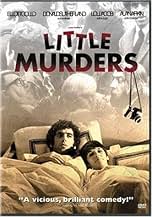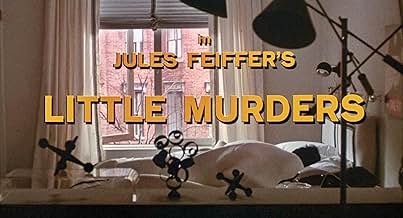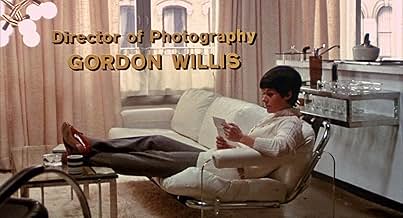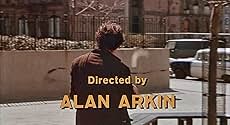Dark comedy where Alfred Chamberlain copes with urban violence, obscene phone calls, rusty water pipes, electrical blackouts, paranoia, and racial conflict during a 1970's summer as he gets ... Read allDark comedy where Alfred Chamberlain copes with urban violence, obscene phone calls, rusty water pipes, electrical blackouts, paranoia, and racial conflict during a 1970's summer as he gets to know his girlfriend Patsy Newquist's family.Dark comedy where Alfred Chamberlain copes with urban violence, obscene phone calls, rusty water pipes, electrical blackouts, paranoia, and racial conflict during a 1970's summer as he gets to know his girlfriend Patsy Newquist's family.
- Awards
- 1 nomination total
- Checkpoint Police Officer
- (uncredited)
Featured reviews
I saw this film and then read the play it was based on, and both give off the same claustrophobic air of desperation while still being side-splittingly funny. It is definitely worth hunting down. In the words of Father Dupas, it is "all right."
The backdrop is an increasingly violent NYC in which property is randomly vandalized more than robbed, people are at first attacked - the way that Alfred was - and then random shootings/murders by unnamed snipers begin. Patsy's family of origin are like an educated version of The Bunkers on All In the Family. Eventually they have steel panels installed on their windows so that the snipers will not shoot into their apartment.
Alan Arkin plays a cop driven mad by all of the homicides in which the victims come from every walk, age, and ethnicity and none of them apparently knew their assailants.
Donald Sutherland has a small but memorable role as pastor of the First Existential Church who is able to grant Alfred and Patsy's request that the name of the deity not be mentioned in their wedding ceremony. His sermon - and he airs everybody's dirty linen at this time, apparently not believing in the confidentiality of the clergy - during that service starts a free-for-all fist fight.
The film has a very tie-dyed feel about it that is distinctively early 70s, yet how it deals with all of the random violence, particulary the frightening origin of the random killings in the final scene, seems all too "ripped from the headlines".
The pulse of this movie is subversive and menacing, and even though there are many, many great laughs, I think the classification of it as a comedy is wrong. It never feels like a comedy. In terms of tone, it is something like the pilot for Twin Peaks and a Mamet play and an Odets play, but with some strange off off off off Broadway claustrophobia and seventies nihilistic horror. It displays a collapsed and paranoid urban environment in which people are combative with words and isolated by them.
I feel it should be essential viewing for any writer, as it contains four of the best-- if not the actual four best-- monologues I've ever heard in a movie. Arkin and Sutherland have amazing monologues that are only marginally upstaged by those given by Gould and Jacobi.
I laughed many, many times (as did many people in the sold out screening I attended), but when it ended, the haunting and thoughtful core of the movie lingered more than did the comedy.
A rich and allegorical piece that deserves serious study and accolades.
(I saw a 35mm print of the movie at Film Forum, N.Y.)
remember as being funny mabey. I was skeptical at the beginning, I thought to myself a dated film with an absurd summery on the back. The only reason I sat and watched it was the list of actors, Sutherland and Gould. I was immediately enthralled. I have been a fan of Terry Gilliam films for a long time and to see a film that can achieve his insanity and social messages with out the elaborate sets and costumes Gilliam uses is astounding. The acting is superb, there is no other word that can encapsulate these performances. Every character is riveting until the end. The monologues given are thought provoking to say the least. My original thought that this film was dated could not be farther from the truth, I was in fact surprised by the connections that can be drawn to our modern times. I am surprised that this film did not receive more praise. It is also disappointing that the other Alan Arkin films were given less than glowing reviews. The only question I have is: is it to late to have a cult following for this movie? Anyone else in?
Keep on the lookout for this in your late night t.v. schedule. It's really worth seeing again (and especially if you haven't seen it yet).
Did you know
- TriviaAfter seeing the film, Jean Renoir wrote to Alan Arkin, telling him "this film will never be forgotten".
- Quotes
Rev. Dupas: Why does one decide to marry? Social pressure? Boredom? Loneliness? Sexual appeasement? Love? I won't put any of these reasons down. Each in its own way is adequate, each is all right. Last year, I married a musician who wanted to get married in order to stop masturbating. Please, don't be startled, I'm not putting him down. That marriage did not work. But the man tried. He is now separated, still masturbating, but he is at peace with himself because he tried society's way.
- Alternate versionsOriginally rated 'R' when released in the U.S in 1971. In 1973 the film was cut to be re-rated 'PG' for a re-release.
- ConnectionsFeatured in Alan Arkin: Live from the TCM Classic Film Festival (2015)
- SoundtracksSkating In Central Park
Composed by John Lewis
Performed by The Modern Jazz Quartet
Through the courtesy of United Artists Records, Inc.
- How long is Little Murders?Powered by Alexa
Details
- Release date
- Country of origin
- Official site
- Language
- Also known as
- Little Murders
- Filming locations
- Brooklyn Boro Hall Court, New York City, New York, USA(courtroom sequence)
- Production companies
- See more company credits at IMDbPro
Box office
- Budget
- $1,340,000 (estimated)
- Runtime1 hour 48 minutes
- Color
- Aspect ratio
- 1.85 : 1































